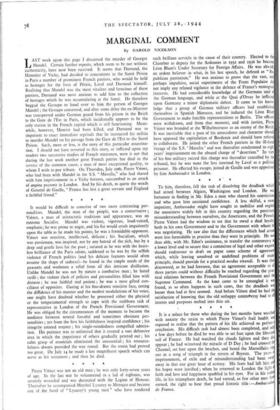Pierre Vienot was not an old man ; he was
only forty-seven years of age. In the last war he volunteered as. a lad of eighteen, was severely wounded and was decorated with the Legion of Honour. Thereafter he accompanied Marshal Lyautey to Morocco and became one of the band of " Lyautey's young men " who have rendered
such brilliant services in the cause of their country. Elected to the Chamber as deputy for the Ardennes in 1932 and 1936 he became Leon Blum's Under Secretary for Foreign Affairs. He was already an ardent believer in what, in his last speech, he defined as " Re. publican patriotism." He was anxious to prove that the vast, and perhaps impulsive, social experiments of the Front Populaire did not imply any relaxed vigilance in the defence of France's strategical interests. He had considerable knowledge of the Germans and of the German language, and while at the Quai d'Orsay he inflicted upon Germany a minor diplomatic defeat. It came to his know- ledge that a group of German military officers had established themselves in Spanish Morocco, and he induced the Leon Blum Government to make forcible representations to Berlin. The officen were withdrawn, and from that moment, and with justice, Pierre Vienot was branded at the Wilhelnistrasse as an enemy of the Reich. It was inevitable that a roan of his antecedents and character should have opposed the capitulation of Bordeaux and should have refused to collaborate. He joined the other French patriots in the ill-fated voyage of the S.S. Massilla ' and was thereafter condemned to eight years' imprisonment on the absurd charge of " desertion." In view of his fine military record this charge was thereafter cancelled by the tribunal, but he was none the less interned by Laval as a political prisoner. He effected his escape, joined de Gaulle and was appointed by him Ambassador in London.


























 Previous page
Previous page